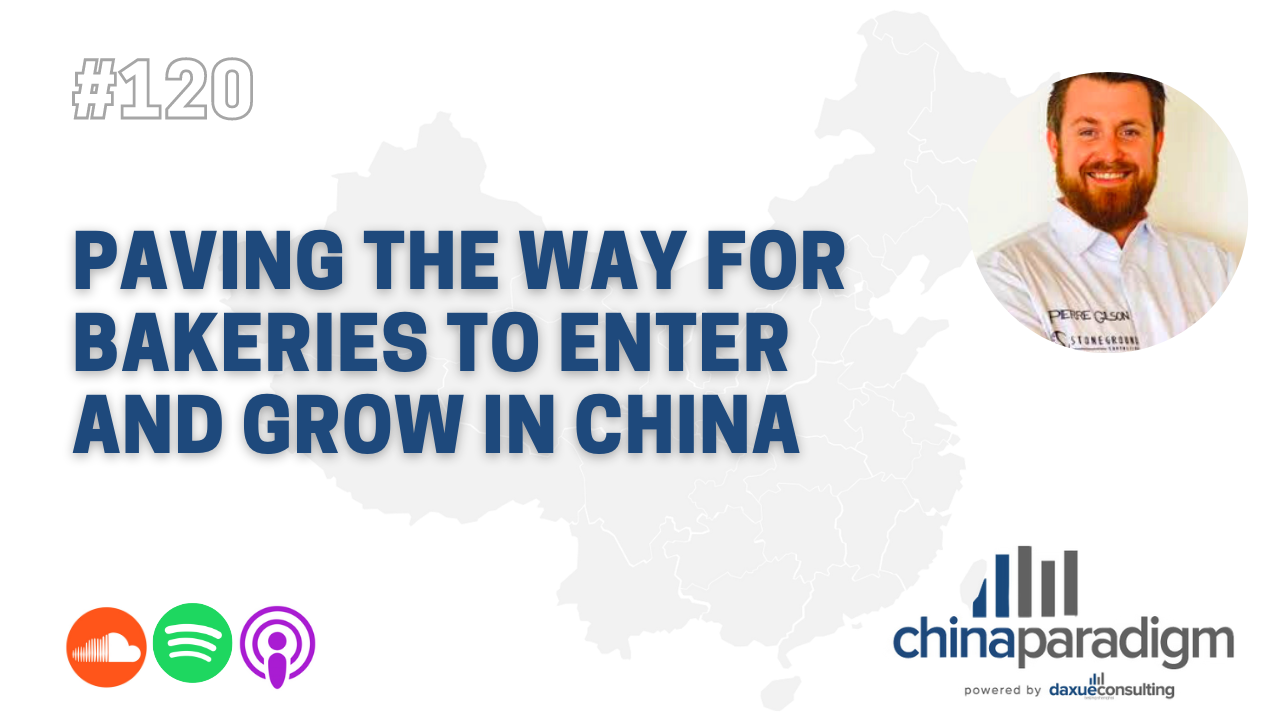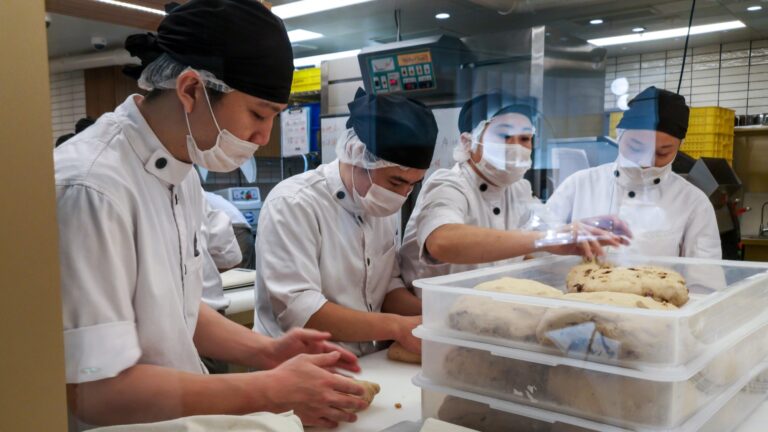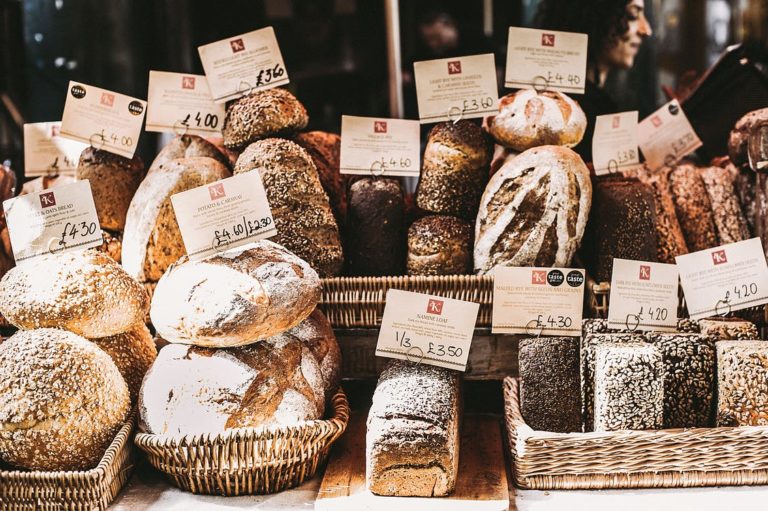Matthieu David: The Chinese bakery and pastry market has changed so much over the last 10 years. It used to be that Paris Baguette, a Korean brand, was the biggest player. Now it is Starbucks. But they are facing strong, albeit much smaller, competition from the likes of Wagas and Baker & Spice.
Today’s guest is Pierre Gilson. He is a baker and pastry chef with over 15 years of experience working with high-end establishments and globally recognized F&B brands. In May 2018, he opened Stoneground Consulting. He advises global food companies such as Andros and Lactalis in operations, staff training, and marketing.
Listen to the full China Paradigm episode 120 on Youtube, Apple Podcast, Spotify, Soundcloud, or Ximalaya.
Consumers have their own preferences in Chinese bakery and pastry market
Matthieu David: How sweet should baked goods in China be to satisfy the needs of local customers?
Pierre Gilson: There are a few differences between the European and Chinese bakery and pastry markets. For one, Chinese consumers generally dislike overly sweet desserts, except for some areas. But in general, desserts must be less sweet than the same desserts in the West. This is a bit of a challenge for European bakeries in China. But to attract mainstream consumers, the sweetness of baked goods in China must be reduced.
Click here to find out how Daxue can help your brand or company conduct market in China.
Matthieu David: What other characteristics of a product need to be adapted for the Chinese bakery and pastry market?
Pierre Gilson: Taste and shape. We are also trying to educate the consumer about Western palates and make them come to our preferred recipes and tastes. I have never used durian, but I have tried using goji berries, matcha, and Sichuan pepper in pastries. The results have been positive.
What is the process of coming up with a good mix of ingredients?
Pierre Gilson: By taste, I like to try and experiment with lots of different Chinese foods. About a year ago, while in Sichuan, I made some chocolate bonbons with Sichuan pepper ganache inside. So, when Alipay came to me and asked me to make a documentary where I baked using Chinese ingredients, I made a chocolate cake with pineapples roasted in Sichuan pepper inside, and it turned out very well.
Matthieu David: What other ingredients besides Sichuan Pepper does Pierre Gilson consider using for his products?
Pierre Gilson: Goji. Also, I know tofu can be used in vegan cakes. Someday I would like to work with durian, but I will need to figure out exactly how to do so first.
Are Chinese consumers pleasantly surprised when they taste Stoneground products?
Pierre Gilson: They were very pleasantly surprised by the chocolate cake I made because the Sichuan pepper and pineapple worked very well together.
Matthieu David: Does the addition of Chinese ingredients contribute to the marketing strategy?
Pierre Gilson: If you want online engagement through pictures that can be shared online, the most important thing is that it looks beautifully presented. But when using KOLs and KOCs, incorporating Chinese ingredients helps a lot.
What was Pierre Gilson’s perception of the Chinese bakery and pastry market when he first arrived in China 5 years ago?
Pierre Gilson: Initially, I went around the city to try out all the different bakeries and get an idea of what was here, and what consumers liked, particularly that was coming out of European bakeries in China. There were many Paris Baguette stores and some genuine Western bakeries but much less than what we currently see. At that time, I was asked to replicate what I had always done in France, but later I realized how important innovation was for baked goods in China.
Matthieu David: How has the Chinese bakery and pastry market changed over the past 5 years?
Pierre Gilson: China is attracting more and more top-level professionals in this field. It is becoming one of the biggest markets in the world for baked goods.
Click here to see how Daxue can help you identify a market for your product/ service in China.
Do Chinese customers consume baked goods on a daily basis or does that happen more on special occasions in China?
Pierre Gilson: It has changed a lot. It is now considered less of a special occasion purchase. 5 years ago, I met a consumer who thought of a baguette as a dessert. But in the last few years, with more and more Chinese traveling to Europe and living there and adopting the local habits around coffee and croissants and then returning to China and looking for the same thing from European-inspired or actual European bakeries in China, purchases of baked goods in China have become more of an everyday thing. But especially outside Shanghai, it has not yet become a daily routine.
Matthieu David: How do Chinese people approach the consumption of croissants?
Pierre Gilson: It’s different from region to region. But in Shanghai, it is often the case that they like to come in groups of friends and buy coffees, croissants, and other baked goods and pastries. It is a social thing in Shanghai. The Chinese bakery and pastry market is less developed in other cities, and it’s more of a discovery purchase. So consumers are just trying it as something fancy or new.
What new interesting pastry and beverage pairings have Pierre Gilson discovered in China?
Pierre Gilson: Not in Shanghai, but if you go outside a little outside Shanghai, like in Minhang, you start to see some interesting combinations like pork on croissants.
Matthieu David: Why are baked goods and pastries overpriced in Shanghai?
Pierre Gilson: To make the best products, you need the best ingredients, particularly butter and flour. And these ingredients are better outside of China, so we have to import them, which brings up the cost of premium baked goods in China.
What is Pierre Gilson’s opinion on the fact that there aren’t any major French entrepreneurs in the café/ restaurant industry in China?
Pierre Gilson: I think French food entrepreneurs do best when they have total control over all aspects. They won’t feel comfortable working in an environment where they can’t guarantee the highest quality ingredients. To scale up in the Chinese bakery and pastry market and become as big as Starbucks, you need to automate production. This is guaranteed to lead to lower quality products, possibly why there is a paucity of global, mass-market French food brands.
What type of services does Stoneground Consulting offer on the marketing side of a bakery & pastry business?
Pierre Gilson: Actually, we work more with clients on the kitchen layout design, equipment supply, sourcing ingredients, opening support, menu design, full team training. So more on operations rather than marketing.
The marketing activities that have the biggest reach seem to be bringing people to events because they can actually taste the products, so I will advise working on taste more than images.
Matthieu David: What was the experience of opening the biggest Starbucks in the world like for Pierre Gilson?
Pierre Gilson: It was very high pressure because within 6 months. I had to ensure that a factory went from not existing to operating and producing goods and all the jobs.
Matthieu David: What other types of market constraints have impacted the way Pierre Gilson works?
Pierre Gilson: Apart from some companies wanting me to add preservatives so that baked goods will stay fresh for 12 to 24 hours, which I will not do, some other challenges are to have a steady supply of the best ingredients at all times.
Matthieu David: What are the challenges of operating a Starbucks kitchen?
Pierre Gilson: I had over 100 people under me, which is not normal for a baker, so I had to learn on the job how to become a manager. You have to be there all the time and keep an eye on every aspect because problems can multiply quickly in a factory.
Matthieu David: Recruitment: how hard was it to find well-trained people?
Pierre Gilson: Well, Starbucks is good at recruitment, so it wasn’t too hard to find ordinary employees. But the biggest issue was to find very trustworthy and skilled people to whom I could entrust a chef’s job.
What is Shanghai Young Bakers and what does it do?
Pierre Gilson: It is an association founded by French people. We teach orphans from the countryside how to bake and offer them a one-year program where they train them in many aspects, essentially giving them the skills to go out and get a good job with European bakeries in China. I am very proud to be involved with the organization.
What source of inspiration has impacted Pierre Gilson the most in his entrepreneurial journey?
Pierre Gilson: I try to take inspiration from everyday things. In terms of books or movies, I don’t really rely on them too much. I have two extremely helpful, life-long mentors, who I can turn to for advice no matter where in the world I am working. But in Shanghai, my wife is a massive help to me in my career.
Mr. Paul Bocuse was a famous chef I had the honor of working under. I always try to emulate him because I have never seen a chef who treated all his staff with such high levels of respect. In return, they respected him. He gives time and attention to everyone, from the dishwasher to the head chef. He made everybody feel as though they were a valued part of the company.
Matthieu David: What does Pierre Gilson do to stay up to date on China?
Pierre Gilson: For food, I subscribe to a French food e-magazine called AtabuLab. I also read a similar kind of publication in English called Eater.
Matthieu David: If he had extra time, what other business ideas would Pierre Gilson pursue?
Pierre Gilson: I would like to do more training. One day, somewhere, I would like to have my own bakery but in shanghai. I feel my calling in the Chinese bakery and pastry market is mostly in training. Not just training professional chefs, but teaching ordinary people how to bake. I want to accomplish a goal in the next few years—more B2C work.
Matthieu David: What is the most surprising experience that Pierre Gilson has had so far in China?
Pierre Gilson: Seeing somebody taking a selfie with a baguette.
What surprising business success or failure has Pierre Gilson witnessed in China?
Pierre Gilson: I think of it a success that there are no huge, fast-growing French pastry brands. Because each French bakery around the world is essentially an ambassador for France and French culture, so I am glad that the experience of going to a French bakery has not been automated, commodified, and scaled-up.
In terms of a surprising failure, I was surprised that the macaron didn’t meet its potential. I think the company that brought it to China failed to localize the product sufficiently.
Listen to the full China Paradigm episode 120 on Youtube, Apple Podcast, Spotify, Soundcloud, or Ximalaya.





